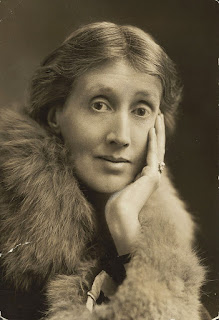Who’s Really Afraid of Virginia Woolf?
by Linda Rodriguez
Virginia Woolf has a reputation for
difficulty that she doesn’t deserve. It came about because she was a
pioneer of stream-of-consciousness technique in the novel to give the
reader the sense of being inside a character’s mind. She and James
Joyce were contemporaneous with this experiment with Dorothy
Richardson slightly ahead of both of them, although Richardson is
little known today. Because Joyce is deliberately obscure and his
work is larded with all kinds of academic tags, as if to show off how
well he was educated by those Jesuits, people assume that Woolf’s is
also virtually impenetrable. And of course, she had bouts of
madness—and then killed herself—so she must have the most
inscrutable, inexplicable books. People are wrong, however.
difficulty that she doesn’t deserve. It came about because she was a
pioneer of stream-of-consciousness technique in the novel to give the
reader the sense of being inside a character’s mind. She and James
Joyce were contemporaneous with this experiment with Dorothy
Richardson slightly ahead of both of them, although Richardson is
little known today. Because Joyce is deliberately obscure and his
work is larded with all kinds of academic tags, as if to show off how
well he was educated by those Jesuits, people assume that Woolf’s is
also virtually impenetrable. And of course, she had bouts of
madness—and then killed herself—so she must have the most
inscrutable, inexplicable books. People are wrong, however.
Virginia Woolf is not only a great
novelist. All of her novels are completely readable still without a
professor at your side to gloss every other word or phrase, and some
of them are great fun. (Try Night and Day, her delightful
version of a Shakespearean love comedy set in the Georgian era, or
Flush, the story of
Elizabeth Barret Browning’s dog from his point of view, or Orlando,
the wild, funny adventures of a character who changes from woman to
man and back through the ages.) She was one of the great writers of
nonfiction. Many are not aware that she actually made her living for
many years writing reviews, critical essays, and articles for the
Times Literary Supplement and many other newspapers and
magazines in England and the United States. Her nonfiction is some of
the most lucid yet lyrical you’ll find anywhere. Her journals are
another literary treasure. In these, she explored writing in all its
glories and horrors, madness and other mental and emotional states,
described the scenery around her—whether countryside or London—and
wrote with anger, love, and humor of the many talented, bohemian,
and/or famous people she knew and met. They are must reading for any
writer. And finally, her letters are the most fun in the world to
read. Virginia knew what snark was before the word (in its current
usage) was invented. And she didn’t spare herself with her witty
tongue.
novelist. All of her novels are completely readable still without a
professor at your side to gloss every other word or phrase, and some
of them are great fun. (Try Night and Day, her delightful
version of a Shakespearean love comedy set in the Georgian era, or
Flush, the story of
Elizabeth Barret Browning’s dog from his point of view, or Orlando,
the wild, funny adventures of a character who changes from woman to
man and back through the ages.) She was one of the great writers of
nonfiction. Many are not aware that she actually made her living for
many years writing reviews, critical essays, and articles for the
Times Literary Supplement and many other newspapers and
magazines in England and the United States. Her nonfiction is some of
the most lucid yet lyrical you’ll find anywhere. Her journals are
another literary treasure. In these, she explored writing in all its
glories and horrors, madness and other mental and emotional states,
described the scenery around her—whether countryside or London—and
wrote with anger, love, and humor of the many talented, bohemian,
and/or famous people she knew and met. They are must reading for any
writer. And finally, her letters are the most fun in the world to
read. Virginia knew what snark was before the word (in its current
usage) was invented. And she didn’t spare herself with her witty
tongue.
I keep using that word fun which
I imagine you never thought you’d hear applied to Virginia Woolf, but
she’s not the tragic figure so many think her. True, she had bouts of
madness throughout her life, and in part because she’d been molested
as a child by an older stepbrother, she avoided sex and never had
children. Yet she had a truly happy marriage to one of the leading
intellectual lights of the day, Leonard Woolf, who adored her and was
devoted to her, impoverishing himself at times to take care of her
when the insanity descended. In fact, it was that loving bond between
her and her long-time husband that led to her suicide. She felt the
madness coming back and couldn’t bear to put him through that ordeal
one more time. Also, she was a social butterfly. She loved people,
and they loved her in return, even when they might get feelings hurt
over a bit of snark directed their way. She would always be upset
that she had hurt anyone and apologize, explaining that it didn’t
mean she didn’t love them but was just the writer’s eye noticing
little eccentricities and commenting on them—and the people she
knew were loaded with eccentricities and bizarre oddities, as well.
Virginia was basically a happy person when healthy.
I imagine you never thought you’d hear applied to Virginia Woolf, but
she’s not the tragic figure so many think her. True, she had bouts of
madness throughout her life, and in part because she’d been molested
as a child by an older stepbrother, she avoided sex and never had
children. Yet she had a truly happy marriage to one of the leading
intellectual lights of the day, Leonard Woolf, who adored her and was
devoted to her, impoverishing himself at times to take care of her
when the insanity descended. In fact, it was that loving bond between
her and her long-time husband that led to her suicide. She felt the
madness coming back and couldn’t bear to put him through that ordeal
one more time. Also, she was a social butterfly. She loved people,
and they loved her in return, even when they might get feelings hurt
over a bit of snark directed their way. She would always be upset
that she had hurt anyone and apologize, explaining that it didn’t
mean she didn’t love them but was just the writer’s eye noticing
little eccentricities and commenting on them—and the people she
knew were loaded with eccentricities and bizarre oddities, as well.
Virginia was basically a happy person when healthy.
So I’d like to suggest that you pick up
one of her books or volumes of letters or journals at the library. If
you’re afraid to try her fiction, you might try A Room of Her Own
(a phrase that Virginia gave to modern feminists), in which she
speaks of women artists, particularly women writers, and the way the
patriarchal world of the early 20th century was set
against their development and success. It’s very short and
compelling, including a passage about Shakespeare’s anonymous sister
who was even more gifted and went mad and died at a deserted
crossroads. (This is a masterful tiny work of fiction, and ever since
reading it that sister of the Bard’s has always been real to me.) If
you want one of her novels that was not experimental, try Night
and Day. If you want to try an experimental novel, you might
start with To the Lighthouse, one of her early masterpieces
and extremely readable. Or pick up a volume of her letters or
journals for terrific humor and a look into the creative process of a great
writer.
one of her books or volumes of letters or journals at the library. If
you’re afraid to try her fiction, you might try A Room of Her Own
(a phrase that Virginia gave to modern feminists), in which she
speaks of women artists, particularly women writers, and the way the
patriarchal world of the early 20th century was set
against their development and success. It’s very short and
compelling, including a passage about Shakespeare’s anonymous sister
who was even more gifted and went mad and died at a deserted
crossroads. (This is a masterful tiny work of fiction, and ever since
reading it that sister of the Bard’s has always been real to me.) If
you want one of her novels that was not experimental, try Night
and Day. If you want to try an experimental novel, you might
start with To the Lighthouse, one of her early masterpieces
and extremely readable. Or pick up a volume of her letters or
journals for terrific humor and a look into the creative process of a great
writer.


